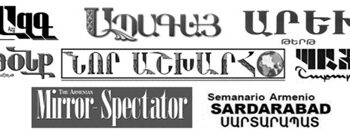WASHINGTON — Congressman Frank Pallone, Jr. (D-NJ), along with Armenian Caucus leaders David Valadao (R-CA), Gus Bilirakis (R-FL), Adam Schiff (D-CA), and Brad Sherman (D-CA), are spearheading a resolution condemning Azerbaijan’s blockade of the Armenians of Nagorno-Karabakh (Artsakh) and ongoing human rights violations, calling on President Biden to immediately suspend U.S. military and security assistance to Azerbaijan and to fully enforce Section 907 of the FREEDOM Support Act, and provide U.S. humanitarian and development assistance to the Armenian victims in Nagorno-Karabakh.
The bipartisan resolution, which began circulating on January 26 for original co-sponsors, states that “Azerbaijani forces [are] in violation of international obligations to resolve disputes with Armenia and Artsakh peacefully,” following their large-scale, unprovoked invasion of Artsakh in 2020.
The resolution states that “President Ilham Aliyev of Azerbaijan has used vitriolic rhetoric to call for the ethnic cleansing of indigenous Armenians in Nagorno-Karabakh and his regime has consistently violated important international humanitarian legal agreements during the 2020 war and up until the present date, including the Universal Declaration of Human Rights, the United Nations Charter, and the Geneva Convention.”
Evidence of Azerbaijan’s violations of international humanitarian law during the 2020 war — including rocket strikes on civilian infrastructure such as hospitals and schools, the decapitation of civilians, the use of white phosphorus munitions, and the torture and killings of Armenian prisoners of war — are well-documented by reputable non-governmental organizations such as Columbia University’s Institute for the Study of Human Rights, Human Rights Watch, Amnesty International, and the International Committee of the Red Cross.
The resolution emphasizes that the November 2020 ceasefire statement that ended the 2020 war signed by Azerbaijan “clearly states in Article 6 that, ‘The Lachin Corridor (5 km wide), which will provide a connection between Nagorno-Karabakh and Armenia while not passing through the territory of Shusha, shall remain under the control of the Russian Federation peacemaking forces…The Republic of Azerbaijan shall guarantee the security of persons, vehicles and cargo moving along the Lachin Corridor in both directions.’“
Despite the Article, on December 12, 2022, “Azerbaijan created a man-made humanitarian crisis by implementing an extended blockade of the Lachin Corridor under the guise of a civilian protest” which has resulted in “dangerous, escalatory steps.”
The closure of the Lachin Corridor — which serves as a vital lifeline connecting the Republic of Artsakh to the Republic of Armenia — and its blockade prevents food, critical medical supplies, and other essentials from reaching 120,000 people, and has “severely worsened the quality of life for the people living in Artsakh, including 30,000 children, 20,000 elderly individuals, and 9,000 people with disabilities, including the sabotage of civilian infrastructures such as a critical natural gas pipeline, power transmission lines, and fixed-line internet.”
The U.S. Department of State has time and again warned that the “closure of the Lachin Corridor has severe humanitarian implications and sets back the peace process,” and publicly called “on the government of Azerbaijan to restore free movement through the corridor.”
In addition to condemning the blockade of the Lachin Corridor, calling for the immediate suspension of U.S. assistance to Azerbaijan, and providing humanitarian aid, the resolution also encourages the U.S. and international community to petition the International Court of Justice, European Court of Human Rights, or other appropriate international tribunals, “to take appropriate steps to investigate any and all war crimes committed by the Azerbaijani forces,” while also calling on the U.S. to deploy international observers to the Lachin Corridor and Artsakh “to explore opportunities for more effective and sustainable guarantees of security and peaceful development,” as well as “support U.S. sanctions under existing statutory authority against Azerbaijani officials responsible for the blockade of Nagorno-Karabakh and other well-documented human rights violations committed against Armenians in the region.”
“The Assembly applauds the tireless efforts of the Armenian Caucus leadership to hold Azerbaijan accountable for its continuous human rights violations against the Armenian people of Artsakh, particularly as Azerbaijan’s blockade, which has spurred yet another humanitarian crisis, is in its seventh week,” said Assembly Congressional Relations Director Mariam Khaloyan. “We urge the U.S. and the international community to stop Azerbaijan’s attempts at ethnically cleansing the Armenian people and destabilizing the South Caucasus region for its own gain.”
The Armenian Mirror-Spectator







